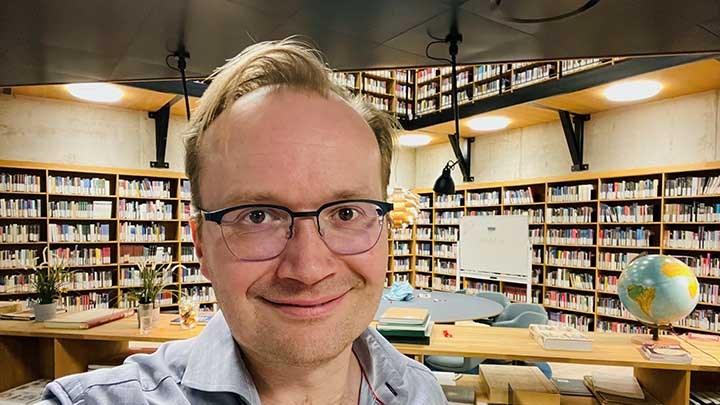Jonatan Leer

Jonatan Leer is professor of culinary arts and meal science. His latest research focuses mainly on food, sustainability, and men.
“We’re exploring why men are slow to embrace the green transition and adopt a sustainable consumption behaviour,” he says.
1980 born in Århus, Denmark
2014 Obtained his PhD in food culture at the University of Copenhagen with his thesis What’s Cooking, Man? Constructions of Masculinity in European Cooking Shows post-The- Naked-Chef in Light of “the Crisis in Masculinity”
2018 Docent in food and tourism studies, University College Absalon, Slagelsen, Denmark
2024 Professor of culinary arts and meal science, Örebro University
Jonatan Leer comes most recently from Ålborg University. For him, communicating research is important.
“I want my research to be read not only by other researchers but to be published in other formats and contribute to stimulating change and discussion in society. That’s why I often participate in the media and perhaps in unusual formats to convey research, such as at music festivals,” he says.
Jonatan Leer’s academic background includes a Bachelor’s degree in French and a Master’s in cultural studies.
Interest since childhood
“Ever since I was a child, I have had a tremendous interest in food, thanks partly to multiple stays in France and Spain. But it wasn’t until my doctoral thesis that I got to work scientifically with food culture, which is the focus of all my research.”
For Jonatan Leer, researching food culture means studying the significance of food as well as the social patterns, relationships, and conflicts associated with it, as food is so much more than energy for our bodies.
“Food is a source of identity, community, enjoyment, disgust, and history. If we want to understand man’s relationship and experiences with food, we must also understand these dimensions.”
Men’s presence in the kitchen differs from women’s
In his doctoral thesis, Jonatan Leer analysed the changes in masculinity in the food media after Jamie Oliver established a new, modern way of being a man in the kitchen. He concluded that although the models for masculinity had changed, men still found ways to differentiate themselves from women.
“Male chefs travelled around the world and explored new exotic cooking. Or they cooked in the company of other men, during a hunt or in summer houses far from home and everyday cooking. This discovery has meant that I keep a critical eye on gender stereotypes still recurring in food culture.”
Since then, he has worked extensively with new Nordic cuisine and the development of restaurants in the Nordic countries since the turn of the millennium, particularly with research on local ingredients and traditions.
Local and global with hipster food
Jonatan Leer has examined the tensions between using local ingredients and traditions and the global ideals of openness to other food cultures. Jonatan Leer has developed this local-global perspective in his analyses of hipster food culture. This ethical food culture exists mainly in cities based on craftsmanship and retro design – picture sourdough bakeries, microbreweries, and worn-down industrial areas transformed into trendy food spots.
The role of media in food culture has also been a recurring theme in Jonatan Leer’s research, resulting in several books. On the one hand, he describes the ever-increasing development of food filling the media. On the other hand, digitalisation in society has meant that the media has entered our kitchens –we search for recipes, share pictures, and shop online. In 2024, food consumers are habitual consumers of media.
Meat as part of culture
In his current research, Jonatan Leer has focused on food and sustainability, including authoring a book about meat as a cultural phenomenon. As early as 2019, the Nordic Council of Ministers funded a significant project focused on sustainable food tourism within the Nordic region.
“Here, I became aware of how culinary experience design – all aspects around a meal, such as the room, the atmosphere, and communication – can contribute to changing people’s understanding and interest in eating more sustainably.”
Since then, Jonatan Leer has been involved in key sustainability projects. One is Masculinities in Green Transition, which deals with why men seem slower to embrace the green transition and consume and behave more sustainably. He participates in an EU project on establishing circular food systems in the Baltic countries. Both projects examine how different actors in the food systems – individuals and more prominent actors – need to change their habits to facilitate the green transition. The goal is to investigate these problems and their complexity scientifically.
“It’s also about how knowledge can contribute to creating new solutions. I look forward to developing the perspective further at Örebro University’s School of Hospitality, Culinary Arts and Meal Science. With a particular focus on how the design of meals and food experiences can facilitate the green transition,” says Jonatan Leer.
